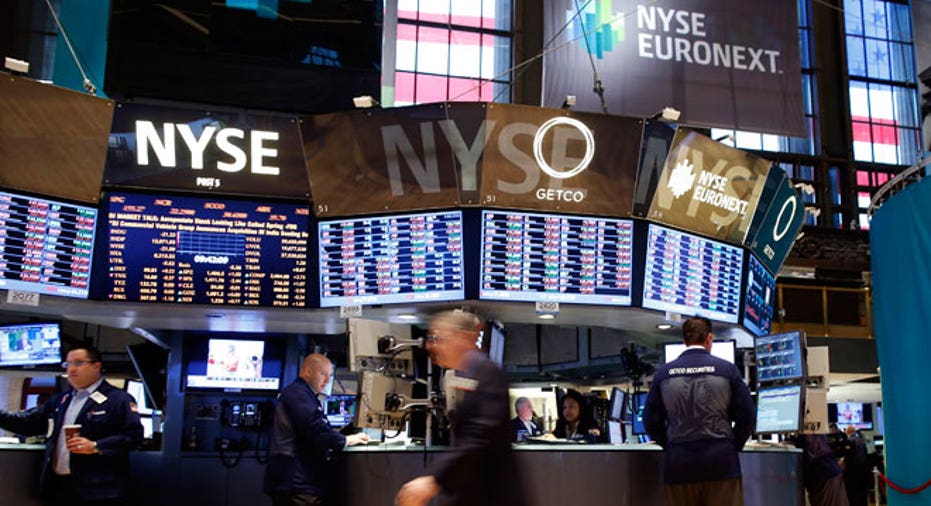Wall Street Ends Flat Ahead of Jobs Report

After seesawing through afternoon action, Wall Street ended near the flat line as traders braced for Friday’s August jobs report.
The Dow Jones Industrial Average rose 22 points, or 0.14% to 16373. The S&P 500 gained 2 points, or 0.11% to 1951, while the Nasdaq Composite ticked 16 points lower, or 0.35% to 4733.
Today’s Markets
Major U.S. averages pared significant gains on Thursday as heavyweights including Apple (NASDAQ:AAPL), Google (NASDAQ:GOOGL), and Facebook (NASDAQ:FB) each dropped more than 1% on no particular news, sending the tech-heavy Nasdaq into negative territory.
Traders in the U.S. prepped for the all-important August jobs report due out at 8:30 Friday morning. An already closely-watched report, last month’s figures will be the last significant read on the labor market before the Federal Open Market Committee’s September 16-17 meeting – a gathering in which many on the Street still expect members to vote for the first interest-rate increase since the Great Recession.
There was no shortage of economic data to digest on Thursday. The Commerce Department reported the U.S. trade gap narrowed the most in five months, and more than expected. The deficit was $41.86 billion in July, down from $45.21 the month prior. Meanwhile, weekly jobless claims rose more than expected last week.
Data from the Institute for Supply Management on the U.S. services sector showed continued expansion in August, but off a ten-year peak. The ISM’s gauge fell to 59 during the month from 60.3 in July. However, the reading was better than the fall to 58.1 economists forecasted.
“[Yesterday’s] Beige Book painted a positive picture of the U.S. economy, but it wasn’t good enough to make traders fearful of an interest rate hike next month,” David Madden, market analyst at IG said in a note. “The biggest issues facing the U.S. are outside of its control, and the excessive references to China in the Beige Book suggest that the Fed will be cautious of increasing interest rates.”
Earlier in the session traders around the globe saw a significant boost thanks to the European Central Bank and its monetary policy decision announced at 8:30 a.m. The ECB said it would keep interest rates there unchanged, leaving its refinancing rate at 0.05%, as was largely anticipated.
At a press conference following the announcement, ECB President Mario Draghi said there are renewed risks to economic growth and inflation outlook in the region, adding that the central bank downgraded its GDP forecasts for the euro area. For 2015, the ECB sees GDP increasing by 1.4%, down from a previous forecast of 1.5%. Draghi added that he is prepared to use “all available instruments” if the outlook for inflation changed materially or in the event of “unwanted monetary tightening.”
European equity markets extended their gains on the heels of the announcement. The Euro Stoxx 50, which tracks large-cap companies in the eurozone, jumped 2.23%. The German Dax climbed 2.68%, while the French CAC 40 added 2.17% and the UK’s FTSE 100 gained 1.82%.
IHS Global Insight Chief European and UK Economist Howard Archer said the door is now “wide open” to ramping up or extending quantitative easing.
“Whether the ECB steps through that door will clearly depend on whether eurozone growth continues to struggle and inflation prospects deteriorate further,” he wrote in a note. “In the meantime, the ECB will undoubtedly be hoping that the very real possibility of more QE to come will exert downward pressure on the euro, which would be beneficial for lifting growth and inflation prospects.”
During Draghi’s speech, the euro saw a big move down, and in recent action, it was 1.10% lower against the U.S. dollar. Meanwhile, the yield on the benchmark U.S. 10-year Treasury bond declined 0.016 percentage point to 2.177%.
What added to the sudden stability in the global markets was the absence of action in China. Traders there took a break from market action for a two-day celebration to commemorate the end of World War II.
Equity markets in Asia were mixed on Thursday: Hong Kong’s Hang Seng declined 1.18%, while Japan’s Nikkei rose 0.48%.
“Previously, dealers have been cautious about bargain hunting after many had their fingers burnt, but with China closed until next week, traders are taking advantage while they can. China has been the single biggest source of uncertainty in the financial markets in the past few weeks, and for the next two trading sessions, that uncertainty has been removed,” David Madden, IG market analyst, said in a note.
In commodities, after wild gyrations in the global oil markets, prices calmed a bit on Thursday. U.S. crude rose 1.08% to $46.75 a barrel, while Brent, the international benchmark rose 0.36% to $50.68 a barrel.
Gold dipped into negative territory, declining 0.86% to $1,123 a troy ounce, while silver ticked 0.08% lower to $14.66 an ounce. Copper, meanwhile, jumped 1.85% to $2.38 a pound.



















